A Deep Dive into Munich's Brewing Heritage
Munich, the beer capital of the world, is renowned globally for its rich history, stunning architecture, and vibrant cultural scene. However, its most celebrated attribute is its status as the "Beer Capital."
The origins of Munich's beer culture are deeply rooted in its history, dating back centuries to a time when the art of brewing was a sacred craft. Beer is an intrinsic part of local celebrations, traditions, and social interactions. Whether it's the jovial atmosphere of beer gardens, the conviviality of beer halls, or the excitement of the annual Oktoberfest.
The term "beer capital Munich" refers to the city of Munich in Germany, which is renowned for its rich beer culture and tradition. Munich is often regarded as the beer capital due to its famous beer gardens, historic breweries, and the annual Oktoberfest celebration.
Münchner Hell
The city's beer culture is more than just a casual affair; it's a way of life, an integral part of its social fabric, and a source of immense pride for its residents.
In this article, we'll embark on a journey to unveil the captivating story behind Munich's Beer Capital title, exploring its beer history, vibrant culture, iconic beer gardens, traditional breweries, the world famous Oktoberfest, and the unique experiences that make Munich a haven for beer enthusiasts.
Origins and Early Growth of the Beer Capital Munich
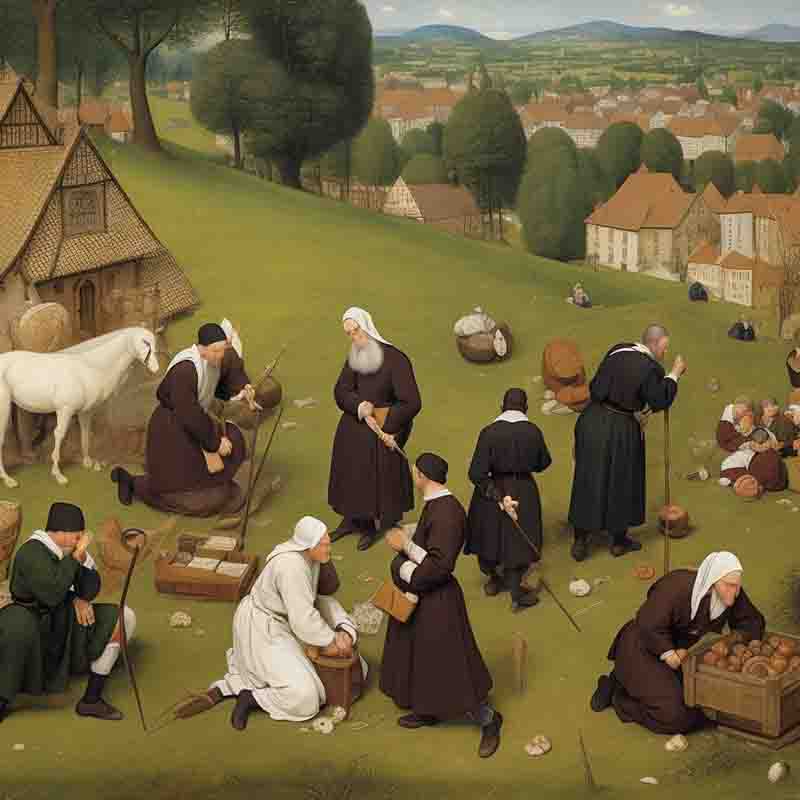
Beer in Munich is a liquid history book, each sip a chapter that tells the tale of the city's past. As travelers raise their glasses, they become part of a narrative that dates back centuries, connecting them to the generations of beer enthusiasts who have come before.
The foundations of Munich's illustrious beer history were laid in the shadows of monastic walls, where the alchemy of brewing found its first whispers in the 7th century.
Within the confines of a monastery, nestled amidst Munich's tranquil landscapes, the art of beer brewing began its journey—an endeavor that would soon evolve into a cultural cornerstone.
As Munich blossomed into a city in the 11th century, the seeds of brewing that had been sown centuries before started to bear the fruits of an industry.
The convergence of fertile farmlands, pristine water sources, and a growing population created a fertile breeding ground for the nascent art of brewing.
Beer, once a modest creation of necessity, was now poised to become an emblem of Munich's identity.
In the shadow of ancient stone walls, monks brewed their concoctions with a blend of craftsmanship and devotion, their recipes passed down through generations like sacred texts.
These early brewing efforts may have been humble in scope, but they laid the groundwork for an extraordinary legacy that would shape the destiny of Munich and its cherished connection to beer.
As the city flourished, the aroma of malt and hops began to permeate the air, intertwining with the daily lives of Munich's inhabitants.
What had once been a hidden craft confined within the walls of monasteries was now becoming a central facet of the city's culture.
It's in these formative years that the seeds of an industry were sown, and the stage was set for Munich to emerge as a true beer capital.
The 7th to 11th centuries represent a crucial chapter in Munich's beer story—a time of inception, where the humble beginnings of brewing laid the groundwork for the centuries of growth, innovation, and celebration that would follow.
As the calendar turned and Munich evolved, its path was forever intertwined with its rich beer culture - a legacy that would help the city achieve global recognition as the unrivalled beer capital of the world.
Establishing the Munich Brewing Icons
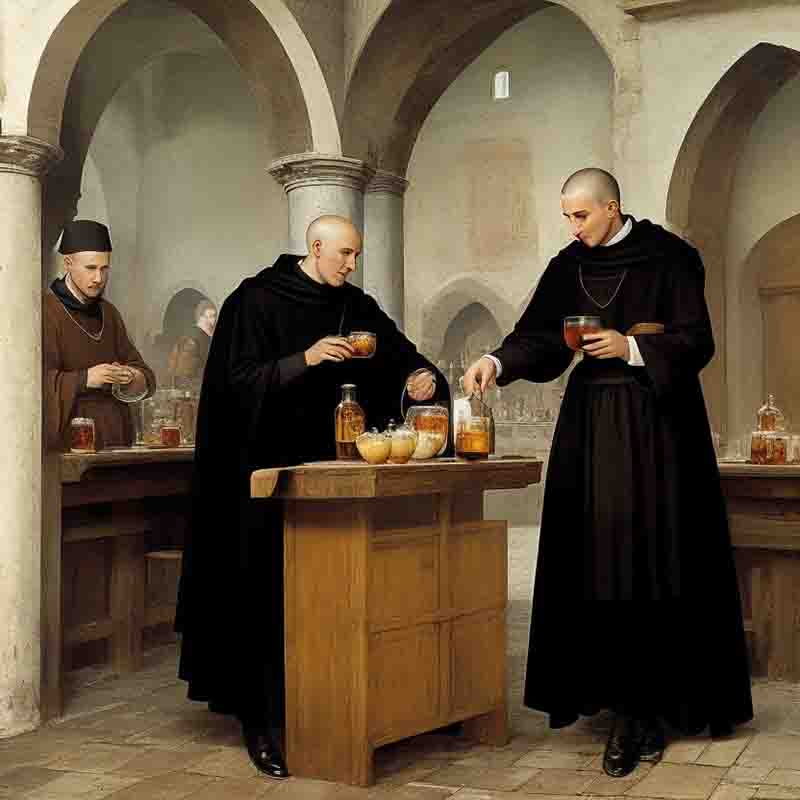
At the heart of Munich's identity as a beer capital is a rich and storied history of brewing that stretches far back into history. This heritage is more than just a chronicle of beer making; it is a testament to the city's enduring connection with the amber elixir, a connection that has shaped its culture, its traditions and even its way of life.
The 14th century marked a pivotal period in Munich's beer history with the emergence of Augustiner, a name that would resonate through the ages.
Founded by the Augustinian monks in 1328, Augustiner Beer is the city's oldest and most revered brewery.
The monastery's tranquil halls gave birth to a brewing tradition steeped in devotion, and their creations mirrored the essence of Bavarian heritage.
As the aroma of malt filled the air within the monastery walls, Augustiner's Helles, Märzen, and Salvator beers became testaments to time-honored brewing techniques.
These brews, crafted with meticulous care, encapsulated the essence of Bavarian beer culture—crisp, flavorful, and evocative of the region's bountiful harvests.
The Spaten brewery, founded in 1397, is among the oldest breweries in Munich. In 1894, Spaten made history with the introduction of "Helles" - a discovery that would change Munich's brewing landscape forever.
The merger with the Franziskaner Brewery in 1922 established the foundation of the Spaten-Franziskaner-Bräu.
Lighter and more refreshing than its predecessors, this golden-coloured elixir became a harbinger of innovation while remaining true to Bavarian brewing tradition.
Boasting a history that dates to 1447, Hacker-Pschorr is celebrated for its dark beers like Dunkel and Maibock, alongside classics like Helles and Märzen.
The brewery's versatility mirrors Munich's dynamic beer landscape.
Born in 1524, the iconic Munich beer brand Löwenbräu emerged onto the scene with an iconic emblem—a red lion that would come to symbolize Munich's brewing legacy.
With a focus on Helles, Märzen, and Oktoberfestbier, Löwenbräu's creations spoke not only of tradition but also of the city's vibrant spirit.
The very name resonates with history and camaraderie. Established in 1589 by Duke Wilhelm V of Bavaria, the Hofbräuhaus stands as a testament to Munich's beer culture.
Its cavernous halls echo with the laughter of generations, its tables witness friendships forged over frothy mugs, and its spirit embodies the Gemütlichkeit that Munich is known for.
Founded by the Paulaner monks of the Neudeck ob der Au monastery in 1634, the brewery's most famous beer is the Paulaner Salvator, a strong dark malty beer.
Paulaner also produces a variety of other beers, such as its Helles, Märzen, and Oktoberfestbier.
These legendary beer brands, steeped in history and bound by a shared passion for brewing, laid the cornerstone for Munich's identity as a beer capital.
From Augustiner's monastic origins to Spaten's pioneering spirit, Löwenbräu's heraldic emblem, and Hacker-Pschorr's masterful blend of flavors, these breweries created a symphony of tastes that resonated with Munich's past, present, and future.
Their commitment to tradition, innovation, and unwavering quality set the stage for what was to come—a city that would not only honor its brewing heritage but also celebrate it with a global audience.
Reinheitsgebot and Cultural Significance
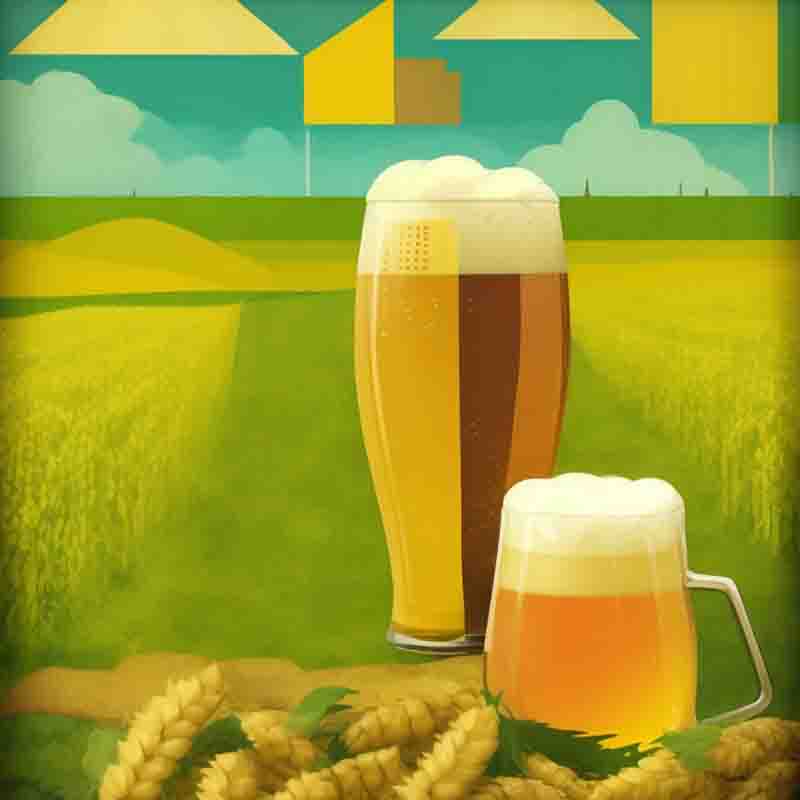
Beyond Oktoberfest, Munich's beer halls are vibrant centers of conviviality. Stepping into these historic establishments is like stepping into a time capsule, where the clink of steins, the lively music, and the aroma of hearty Bavarian fare create an ambiance that's both festive and timeless.
In the heart of Munich's brewing journey, a monumental decree forever changed the course of the city's beer legacy.
The 15th century marked a turning point with the introduction of the Reinheitsgebot, commonly known as the Purity Law.
Issued by Duke Albrecht V of Bavaria in 1487, this law mandated that beer could be brewed using only water, hops, and barley malt—a revolutionary declaration that would become a cornerstone of Munich's brewing tradition.
The Reinheitsgebot resonated far beyond the confines of Munich, shaping the very essence of the city's cultural identity.
By stipulating a strict list of ingredients, the law elevated the quality of beer, ensuring that each sip encapsulated the pure flavors of its components.
This commitment to unadulterated brewing not only set a benchmark for excellence but also showcased Munich's dedication to crafting a product that reflected its values and heritage.
The cultural significance of the Reinheitsgebot extended beyond the realm of brewing. It embodied the spirit of Munich—a city that prided itself on integrity, authenticity, and unwavering commitment to its craft.
The law wasn't merely a set of regulations; it was a statement of Munich's brewing ethos, an embodiment of its pride in producing beer that represented the very essence of Bavaria.
As the centuries rolled on, the Reinheitsgebot's legacy endured. It became a guiding light for Munich's breweries, a symbol of their dedication to creating beer that was not just a beverage, but a testament to tradition, craftsmanship, and purity.
This commitment to quality resonated deeply with beer enthusiasts, fostering an international reverence for Munich's brewing heritage.
The Reinheitsgebot encapsulated Munich's soul. A beer city that celebrated its history, embraced innovation, and above all, valued the art of brewing as a cultural treasure.
This law, harking back to the 15th century, wasn't just a set of regulations; it was a commitment to creating an experience that could be savored, appreciated, and cherished for generations to come.
In a world of ever-changing tastes, the Reinheitsgebot became a timeless thread that wove Munich's beer legacy into the fabric of global admiration.
The Iconic Hofbräuhaus
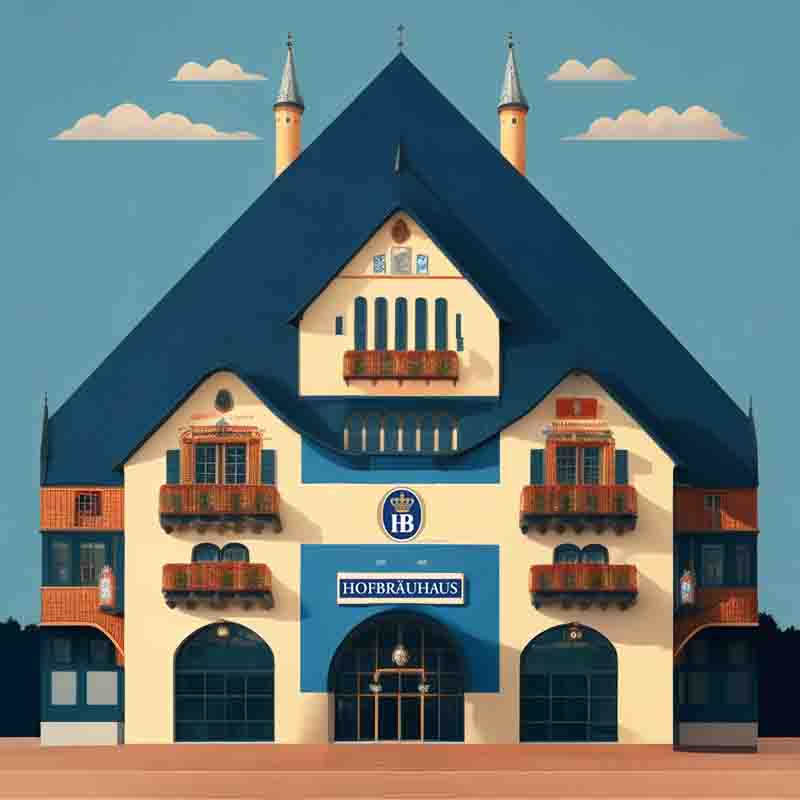
Munich's beer scene is an intricate mosaic that caters to a wide spectrum of tastes and preferences. From the historic beer halls that transport you through time to the modern craft beer movement that pushes boundaries, Munich's Beer Capital status is not solely defined by a single festival; it's a culmination of diverse experiences that offer a true reflection of the city's deep-rooted love for beer.
Founded in 1589 by Duke Wilhelm V of Bavaria, this iconic establishment became far more than a mere brewery—it evolved into a cultural phenomenon that captured the essence of Munich's convivial spirit.
As the doors of the Hofbräuhaus swung open, they welcomed locals and travelers alike into a world of camaraderie and celebration.
This beer hall, with its wooden beams and rustic charm, wasn't just a place to enjoy a drink; it was a space where stories were shared, friendships were forged, and traditions were upheld.
In the centuries that followed its inception, the Hofbräuhaus became a cultural touchstone for Munich, symbolizing the city's rich heritage.
It stood as a haven where laughter echoed off the walls, where strangers became friends over a pint, and where the strains of Bavarian music intertwined with the clinking of mugs.
The Hofbräuhaus wasn't just a building—it was the embodiment of Munich's soul.
The 17th century witnessed the birth of yet another milestone within the Hofbräuhaus—the creation of the Maibock beer.
In 1612, this robust and hoppy brew emerged, a departure from the traditional brown beers of its time.
This innovation showcased Munich's ability to not only embrace tradition but also to push boundaries, creating beers that resonated with evolving tastes while paying homage to their roots
As the years went by, the Hofbräuhaus continued to serve as a beacon of Munich's beer culture.
Its legacy rippled through time, enduring wars, revolutions, and upheavals, a steadfast reminder that amidst the changes of the world, the heart of Munich's beer identity remained unwavering.
Today, the Hofbräuhaus stands as a global icon—a place where locals and tourists gather to experience Munich's vibrant spirit.
It's more than just a beer hall; it's a living connection to the past, a testament to the power of tradition and the joy of camaraderie.
In the 16th and 17th centuries, the Hofbräuhaus carved its name into the annals of Munich's beer history, etching itself as an enduring symbol of the city's timeless, convivial, and unbreakable bond with beer.
The Dawn of Innovation in the Capital of Beer
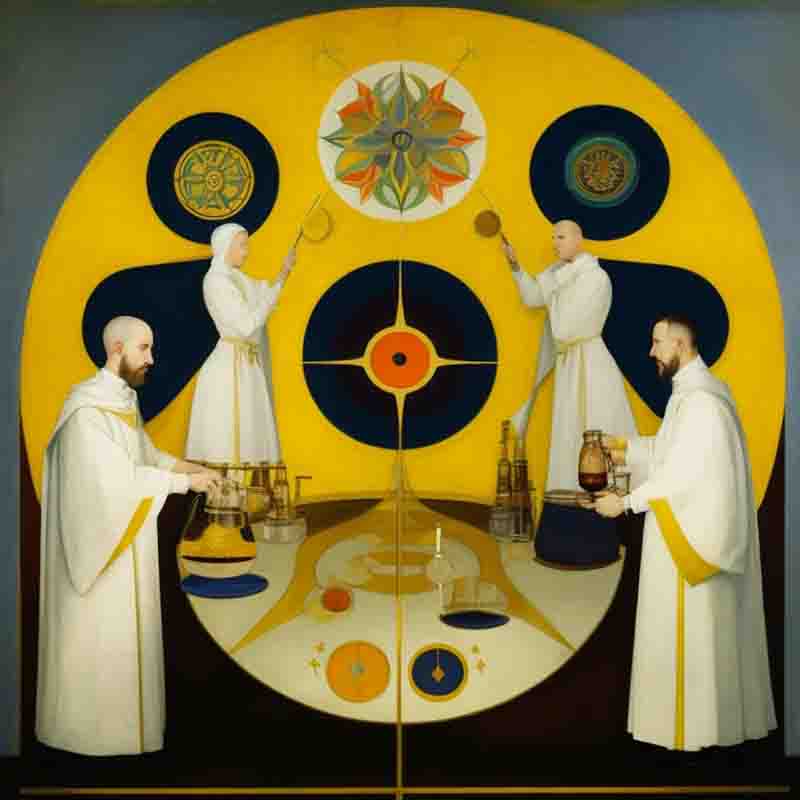
Munich's craft brewers are alchemists in their own right, concocting brews that push the envelope of taste and technique. From barrel-aging to hop-forward ales, these innovators are at the forefront of redefining what beer can be.
Located in the heart of Munich's characteristic streets, the Hofbräuhaus is a lasting testament to the city's beer culture.
The 18th and 19th centuries witnessed Munich's beer landscape undergoing a transformative evolution, as the city embraced innovation while paying homage to its rich brewing traditions.
This era marked a pivotal shift, where breweries ventured beyond the boundaries of convention, giving rise to new flavors, brewing techniques, and cultural celebrations.
In 1803, a wave of secularization swept across Bavaria, leading to the closure of numerous monasteries, including the venerable Augustiner monastery—a brewing institution that had spanned centuries.
However, from the ashes of this change arose a story of resilience and revival. Anton and Therese Wagner took the reins of the Augustiner brewery in 1829, breathing new life into a legacy that had almost faded away.
This revival exemplified Munich's enduring commitment to preserving its heritage, even in the face of adversity.
The 19th century also ushered in a revolutionary moment, thanks to the ingenuity of Gabriel Sedlmayr.
In 1840, as the brewmaster at Spaten brewery, Sedlmayr introduced Helles beer—a lighter, crisper alternative to the traditional dark beers that Munich was renowned for.
This innovation not only set the stage for a new era of brewing but also put Munich on the global map as a destination for beer enthusiasts seeking variety and freshness.
As the 19th century drew to a close, Munich's beer culture expanded its horizons even further with the inception of the Oktoberfest beer festival in 1872.
This annual celebration of Bavarian culture quickly became one of the most renowned festivals in the world, attracting visitors from all corners.
The festival's roots ran deep in Munich's beer heritage, offering a platform to showcase not only its diverse beer offerings but also its lively spirit, cultural richness, and unbreakable ties to tradition.
In the 18th and 19th centuries, Munich's breweries continued to be catalysts for change, proving that innovation need not come at the cost of tradition.
As the city navigated the currents of progress, it remained firmly anchored to its brewing roots, adapting and evolving while retaining the essence that had made it a beer capital.
This era was a testament to Munich's capacity to embrace new ideas while cherishing its past, solidifying its position as a dynamic center of beer culture and creativity.
Oktoberfest and Munich’s Global Influence
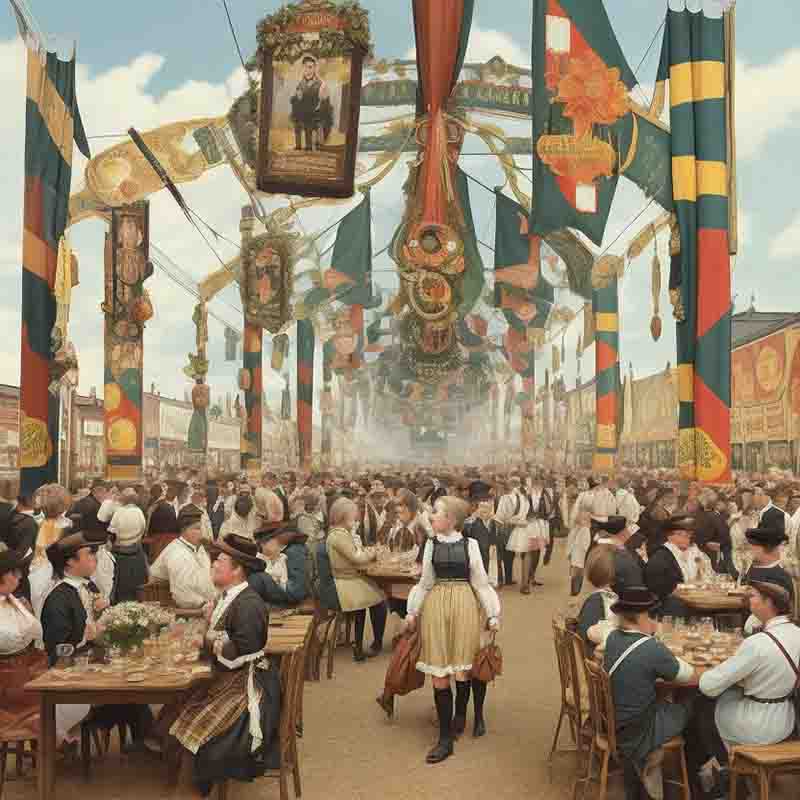
Munich's beer culture is synonymous with celebration, and travelers are invited to join in the revelry. Festivals like Oktoberfest showcase the city's joie de vivre, offering a chance to experience Munich at its most exuberant.
The 19th century saw Munich's beer culture ascend to new heights with the birth of a celebration that would come to define the city on the global stage—the Oktoberfest.
This annual extravaganza, steeped in tradition and exuberance, became a cornerstone of Munich's identity, captivating hearts and palates worldwide.
In 1810, the wedding celebration of Bavarian Crown Prince Ludwig and Princess Therese of Saxe-Hildburghausen marked the inaugural Oktoberfest.
What began as a joyous event, rich in Bavarian traditions, evolved into a festival that transcended borders, celebrating not just the marriage but the heart and soul of Munich itself.
As the years went by, Oktoberfest evolved into a grand carnival of culture, a fusion of gastronomy, music, dance, and, of course, beer.
Munich's breweries seized this occasion to showcase their finest brews, from the beloved Märzen beers to innovative variations that celebrated the festival's vibrant spirit.
Oktoberfest wasn't just a beer festival—it was a living testament to Munich's legacy, a gathering that brought together people from across the world to revel in Bavarian culture.
The 20th century bore witness to Oktoberfest's ascent to international acclaim. It became a global pilgrimage for beer enthusiasts and travelers, a time-honored tradition that encapsulated the essence of Munich's beer heritage.
The festival's reach extended far beyond the city's borders, carrying with it the echoes of centuries of brewing excellence and cultural vibrancy.
The 20th century also witnessed Munich's breweries continue to push the boundaries of brewing, offering new and exciting creations that captured the imaginations of beer lovers around the globe.
From the Paulaner Salvator to the Hacker-Pschorr Dunkel, these brews became synonymous with Munich's dedication to crafting excellence.
As the world navigated the changes of the 20th century, Munich's beer culture remained an unwavering constant—a timeless tradition that held fast to its roots while embracing the evolving tastes of the modern era.
The Oktoberfest's enduring popularity and the global recognition of Munich's breweries served as testaments to the city's profound impact on the world of beer.
In the 19th and 20th centuries, Munich's influence rippled far beyond its borders, painting the world with the rich hues of Bavarian brewing and culture.
Oktoberfest became more than just a festival—it became an emblem of Munich's indomitable spirit, its ability to celebrate tradition while embracing change, and its role as a global ambassador for the art of beer.
Evolution in the Modern Era of Beer’s Capital
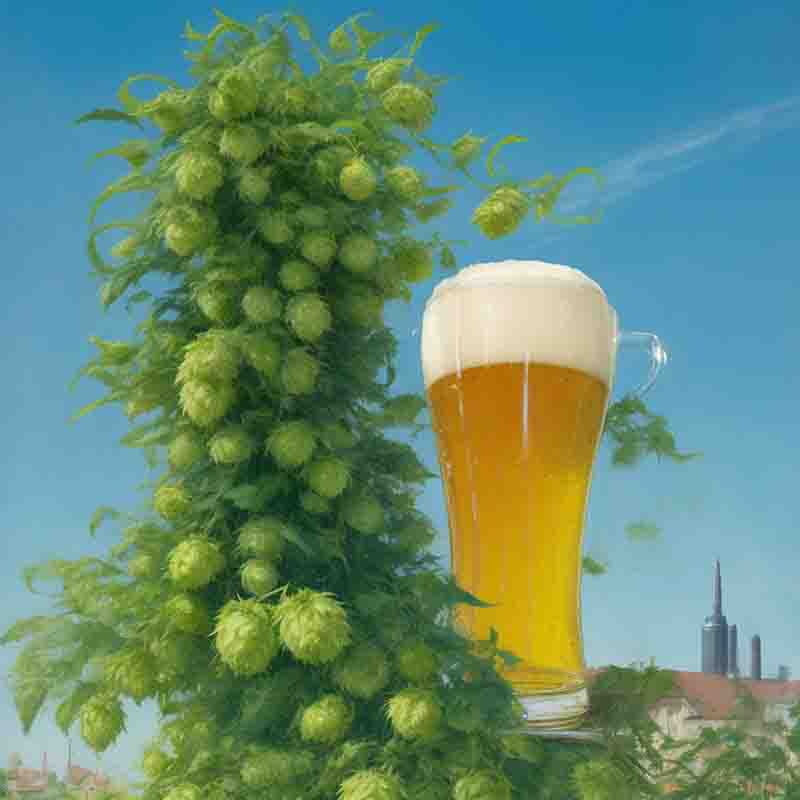
The Munich beer experience is steeped in tradition. From the clinking of glasses during a cheerful "Prost!" to the communal seating in historic beer halls, every gesture and ritual is a nod to a time-honored way of celebrating beer and fostering connections.
As the 20th century unfolded, Munich's beer culture continued to thrive, evolving in sync with the changing times while remaining steadfast in its commitment to tradition.
The city's breweries entered an era of innovation, crafting brews that not only paid homage to their storied past but also set the stage for a new chapter of excellence.
The 20th century witnessed Munich's breweries weaving a tapestry of flavors that captured the hearts of beer enthusiasts around the world.
The Oktoberfest Märzen, with its rich maltiness and nuanced hops, became a global sensation—an ode to the festival that had come to epitomize Munich's beer culture.
The Paulaner Salvator, a dark and robust wheat beer, continued to delight palates, a testament to the brewery's unwavering commitment to crafting exceptional brews.
Hacker-Pschorr's Dunkel, with its depth of flavor and historical significance, offered a bridge between Munich's brewing heritage and contemporary tastes.
These brews symbolized Munich's ability to innovate while honoring the legacy that had shaped its beer culture for centuries.
As the 21st century dawned, Munich retained its status as a global beer capital. The city's breweries, from the iconic Hofbräuhaus to stalwarts like Augustiner, Spaten, and Löwenbräu, continued to brew with the same dedication that had defined their predecessors.
The world-renowned Oktoberfest, a testament to Munich's cultural resilience, drew revelers from all corners of the globe to experience the city's vibrant spirit.
In this era of connectivity, Munich's influence spread like never before. The city's breweries, once local gems, became international sensations.
Beer enthusiasts from every continent sought out Munich's offerings, each sip a homage to the centuries of craftsmanship that had shaped the city's identity.
The 20th and 21st centuries encapsulated Munich's ability to blend the past with the present. With each brew, the city's breweries paid tribute to their storied histories while embracing the future of brewing.
The beer that flowed from Munich's taps was more than a drink—it was a testament to a legacy that had survived wars, revolutions, and technological leaps, remaining a constant in an ever-changing world.
Today, as the world navigates the intricacies of the 21st century, Munich's breweries continue to stand tall as guardians of tradition and beacons of innovation.
The city's beer culture remains an enduring celebration of craftsmanship, camaraderie, and cultural richness—a legacy that has spanned centuries and will continue to flow through the ages.
Munich, the ultimate beer capital, serves as a living testament to the power of beer to unite, to evolve, and to create an everlasting connection between the past, the present, and the future.
Munich Beer - A Timeless Legacy
In the heart of Munich, a city steeped in history and brimming with cultural richness, a timeless legacy flows through the streets and into the glasses of beer enthusiasts from around the world.
The journey through Munich's beer history has been a tapestry woven with threads of tradition, innovation, and unbreakable bonds—a legacy that stands as a testament to the city's enduring commitment to the art of brewing.
From its humble origins in monastic breweries, Munich's beer culture burgeoned into a global phenomenon, a living expression of Bavarian identity and craftsmanship.
The establishment of iconic breweries like Augustiner, Spaten, Löwenbräu, and Hacker-Pschorr laid the foundation for a tradition that would evolve over the centuries without losing touch with its roots.
The Reinheitsgebot, a cornerstone of Munich's brewing philosophy, underscored the city's dedication to purity and quality.
This law, conceived in the 15th century, continues to guide the hands of modern-day brewers, ensuring that each sip of Munich's beer is a journey through time—a taste of centuries past infused with the spirit of the present.
The Hofbräuhaus, with its rustic charm and convivial atmosphere, became more than just a beer hall—it transformed into a living emblem of Munich's beer culture.
The Maibock beer, born within its walls, represented not just a change in flavor but a reflection of Munich's ability to adapt and innovate while staying true to its roots.
The dawn of innovation in the 18th and 19th centuries marked a turning point, as Munich's breweries crafted new flavors, reimagined traditions, and brought to life the iconic Oktoberfest.
This festival, which began as a local celebration, resonated across the world, becoming a symbol of Munich's cultural vibrancy and beer excellence.
In the modern era, Munich's breweries have continued to evolve, crafting brews that bridge the past and the future.
The Oktoberfest Märzen, the Paulaner Salvator, and Hacker-Pschorr's Dunkel exemplify Munich's ability to embrace innovation while maintaining an unwavering commitment to craftsmanship.
Munich's beer culture isn't just about brewing—it's a testament to heritage, a celebration of community, and a journey that transcends time.
It's a legacy that has been carefully nurtured over centuries, where each chapter has added depth to the story, where each sip carries the essence of tradition and the thrill of innovation.
As the 21st century unfolds, Munich remains a beacon in the world of beer, a city where history mingles with the present, where tradition and innovation stand hand in hand.
The clinking of mugs in its beer halls, the echoes of laughter during Oktoberfest, and the aroma of malt and hops wafting through its streets all serve as a reminder that Munich's beer legacy isn't just a story—it's a living, breathing masterpiece, an everlasting tribute to the art of brewing and the spirit of a city that will forever be known as the ultimate Beer Capital.
Diverse Beer Culture in Munich
Munich's beer culture isn't a monolithic entity; rather, it's a rich tapestry woven from a diverse array of traditions, rituals, and practices that collectively define the city's relationship with the beloved beverage. This intricate mosaic of beer culture transcends mere consumption; it's a way of life, an integral part of Munich's social dynamics, and a reflection of the city's distinct identity.
-
The Social Glue: Beer is more than a drink in Munich; it's a social glue that binds the community together. Whether it's coworkers bonding over a pint after work, friends gathering in beer gardens, or families celebrating milestones in beer halls, the act of sharing a beer fosters connections and nurtures relationships.
-
Beer as a Conversation Starter: In Munich, conversations flow as naturally as the beer itself. Bars and beer gardens serve as informal meeting places where people from all walks of life come together to engage in lively discussions, exchange stories, and connect on a deeper level.
-
Craftsmanship Appreciation: Munich's beer culture places a premium on craftsmanship and quality. Locals take pride in the artistry that goes into brewing each batch of beer. This appreciation for quality over quantity underscores the reverence Munich has for its brewing heritage.
-
Cultural Symbolism: Beer has woven itself into Munich's cultural fabric, becoming a symbol of local identity. The beer gardens, with their communal seating and relaxed ambiance, reflect the city's commitment to fostering a sense of community and togetherness.
-
Beer and the Arts: Munich's beer culture also finds expression in the arts. From traditional folk songs to contemporary artistic creations, beer is a muse that has inspired creativity across various mediums
-
Celebrations and Traditions: Festivals and events punctuate Munich's beer calendar, adding vibrancy and excitement to the city's beer culture. These celebrations, whether the grandeur of Oktoberfest or the intimacy of local beer festivals, are an integral part of Munich's social calendar.
Shared Brews, Shared Bonds: Munich Beer as a Social Catalyst
Munich's beer culture isn't limited to a single facet; it's a multifaceted gem that reflects the city's essence. As we explore the Beer Capital's diverse beer culture, we'll uncover the nuances that have transformed a simple beverage into a cornerstone of Munich's social dynamics, traditions, and identity.
Through each sip, each interaction, and each celebration, we'll witness the myriad ways in which beer is an integral thread in the fabric of Munich's way of life.
Iconic Beer Gardens of Munich
Located within Munich's verdant landscapes, the city's iconic beer gardens stand as testament to a tradition that has stood the test of time. These outdoor havens of conviviality have woven themselves into the very fabric of the city, offering a unique blend of nature, camaraderie, and, of course, finely brewed beer. Let's take a leisurely stroll through Munich's renowned beer gardens and uncover the magic that makes them enduring symbols of Gemütlichkeit.
-
Historical Roots: Munich's beer garden culture has deep historical roots that date back to the 19th century. These vibrant spaces were initially established as a way for breweries to sell their beer directly to customers. Over time, they evolved into communal gathering spots that celebrated community, camaraderie, and the joy of shared experiences.
-
Open-Air Oasis: One of the defining characteristics of Munich's beer gardens is their setting. Nestled within lush parks and shaded by towering chestnut trees, these open-air oases offer a respite from the hustle and bustle of city life. From the English Garden to the Nymphenburg Palace Park, each beer garden boasts a unique natural backdrop that enhances the overall experience.
-
Family-Friendly Atmosphere: Munich's beer gardens are not limited to adults; they are family-friendly spaces where people of all ages can enjoy the outdoors together. Children can play in designated areas, creating an environment where multi-generational gatherings flourish.
-
Tradition Meets Modernity: While steeped in tradition, Munich's beer gardens have also adapted to modern times. Some now offer Wi-Fi, live music, and even cultural events, ensuring that the beer garden experience remains relevant to today's diverse audience.
Modern Twists in Munich's Beer Gardens
Munich's iconic beer gardens are more than just places to enjoy a beer; they are living embodiments of the city's sense of community, conviviality, and connection to nature.
As we continue our exploration of the Beer Capital, we'll discover how these timeless spaces seamlessly blend history with modernity, creating an experience that is as authentic as it is inviting.
Whether you're seeking a tranquil afternoon under the trees or a lively conversation with locals, Munich's beer gardens offer an experience that captures the essence of the city.
Guided Journeys Through Munich's Brewing History
For those seeking a deeper understanding of Munich's Beer Capital status, there's no better way to immerse yourself in the city's brewing heritage than through a guided beer tour.
These curated journeys offer more than just a taste of the local brews; they provide a comprehensive exploration of Munich's rich beer culture, weaving together history, tradition, and the art of brewing.
-
Historical Context: Munich's beer tours are not just about sipping beer; they're about stepping back in time. Expert guides transport you to eras when monasteries laid the foundations of brewing, the Reinheitsgebot was enacted, and beer gardens became communal gathering spaces.
-
Brewery Behind-the-Scenes: Many beer tours take you into the inner sanctum of Munich's breweries. Witness the brewing process up close, from mashing and boiling to fermentation and bottling. Learn about the ingredients, the techniques, and the meticulous care that goes into crafting each batch.
-
Master Brewer Insights: The guides on these tours often have a deep understanding of brewing and the city's history. They share fascinating anecdotes, delve into the nuances of Munich's beer styles, and provide insights that transform a simple beer tasting into an educational experience.
-
Beer Tasting Adventures: Beer tastings are at the heart of these tours, offering a journey through Munich's diverse styles and flavors. From malty Dunkels to hoppy Pilsners, each tasting is a chapter in Munich's beer story, providing a sensory understanding of the city's brewing heritage.
-
Cultural Connections: Munich's beer tours don't just focus on the liquid; they connect you to the broader cultural context. Learn about the traditions, rituals, and festivals that revolve around beer, gaining a deeper appreciation for how beer is interwoven into Munich's way of life.
Munich Beer Traditions: More Than Just a Drink
In Munich, beer isn't just a beverage; it's a cultural cornerstone that has shaped the city's identity, rituals, and way of life.
The traditions surrounding beer in Munich are as rich and diverse as the brews themselves, offering a multi-layered experience that goes beyond the act of consumption.
From centuries-old customs to festive celebrations, Munich's beer traditions are woven into the very fabric of the city.
Join us as we dive into the tapestry of Munich's beer traditions, where each sip is a step into a world where beer is more than just a drink—it's a way of life.
-
Gemütlichkeit: At the heart of Munich's beer traditions lies the concept of Gemütlichkeit—a warm-hearted, convivial atmosphere that encourages togetherness and camaraderie. Whether in a bustling beer hall or a serene beer garden, the spirit of Gemütlichkeit envelops patrons, creating an environment where strangers become friends and joy is shared.
-
Prost: The act of raising a glass and exclaiming "Prost!" (cheers) is a Munich beer tradition that transcends language. It's a gesture that encapsulates celebration, friendship, and the simple pleasure of enjoying a good beer in good company.
-
Toasting Rituals: The act of toasting in Munich is accompanied by rituals that honor the drink, the company, and the tradition. The clinking of glasses and the exchange of well wishes are symbolic gestures that add depth and meaning to each sip.
Munich's beer traditions are a testament to the city's enduring connection to its past, its commitment to fostering community, and its celebration of the simple pleasures of life.
As we explore Munich's Beer Capital, we'll unravel the layers of tradition that make each sip of beer a doorway into a world that's steeped in history, warmth, and the ageless art of raising a glass in celebration.
Munich's Iconic Beer Culture and Landmarks
In Munich, beer isn't just a drink; it's a way of life, a cultural identity, and a source of pride. The city's beer culture is a living legacy that shapes its architecture, traditions, and even its landmarks.
As we navigate through Munich's streets, we encounter iconic establishments and spaces that are not only symbols of its beer culture but also windows into its history, camaraderie, and vibrant spirit.
Join us as we raise a virtual stein to explore Munich's iconic beer culture and the landmarks that bring it to life.
-
Hofbräuhaus: Established in 1589, the Hofbräuhaus stands as a testament to Munich's beer culture. Its cavernous halls echo with the laughter of generations, its tables witness friendships forged over frothy mugs, and its spirit embodies the Gemütlichkeit that Munich is known for.
-
Viktualienmarkt: More than just a marketplace, Viktualienmarkt is a tribute to Munich's culinary and beer traditions. Amidst the stalls of fresh produce and gourmet delights, beer gardens offer respite and refreshment. Here, locals and visitors converge to enjoy a leisurely beer in the heart of the city.
-
Nockherberg and Starkbierzeit: Nockherberg, home to the Paulaner Brewery, is synonymous with the Starkbierzeit, the "Strong Beer Season." This tradition dates back to the 17th century, and today, the annual Salvator tapping marks the beginning of this festive period. Munich's iconic Nockherberg and the strong beer it hosts epitomize the city's vibrant beer culture.
-
Beer Gardens of Englischer Garten: The sprawling Englischer Garten is home to some of Munich's most iconic beer gardens. Among the shaded paths and serene ponds, these beer gardens offer a unique blend of relaxation, nature, and the joy of sharing a beer with friends and strangers alike.
-
Giesinger Bräu: In the midst of Munich's traditional beer culture, Giesinger Bräu represents the craft beer movement. This microbrewery combines modern brewing techniques with a reverence for tradition, showcasing Munich's ability to embrace innovation while honoring its roots.
These landmarks stand as living testaments to the city's enduring love affair with beer, offering a glimpse into a culture that is as old as it is vibrant.
The Beer city Munich is represented in the delightful world of Beer wall art and craftsmanship in manifold styles.
Unique limited edition art prints and posters pay homage to Munich and its centuries-old beer tradition in true style.
An eclectic variation of signature steins and beer glasses, that further enhance the flavor and aroma of Muncher beer, are sought-after collectibles and a cool way to stay in touch with the capital of Beer.
Beer Captital Munich: FAQ
Are you curious about music, art, technology, fashion, humanity, lifestyle, and beer?
If so, then you need to subscribe to the free Likewolf newsletter.
100% privacy. When you sign up, we'll keep you posted.
Beer, Brews, and Beyond
Take this comprehensive guide on a trip through the fascinating world of beer.
